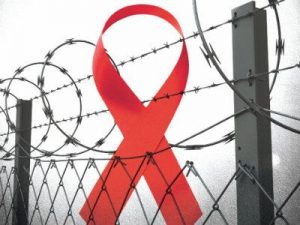 On January 1, 2018, a new rule took effect in North Carolina that modernized the state’s HIV control measures. Although there is no specific HIV-related criminal statute in North Carolina, the North Carolina Commission for Public Health is authorized to adopt rules that prescribe control measures for communicable diseases and conditions, including control measures for HIV. Persons who violate rules adopted by the Commission may be charged with a misdemeanor and be sentenced to a maximum of two years’ imprisonment.
On January 1, 2018, a new rule took effect in North Carolina that modernized the state’s HIV control measures. Although there is no specific HIV-related criminal statute in North Carolina, the North Carolina Commission for Public Health is authorized to adopt rules that prescribe control measures for communicable diseases and conditions, including control measures for HIV. Persons who violate rules adopted by the Commission may be charged with a misdemeanor and be sentenced to a maximum of two years’ imprisonment.
The new rule modernizes the North Carolina HIV control measures that were established in 1988 at the height of the AIDS epidemic as a means to help protect people against HIV infection. The old law required that people living with HIV disclose their HIV status to all sexual partners and the use of a condom during sexual intercourse. In addition, people living with HIV could not donate organs. Similar laws exist in most states in the US. According to the Center for HIV Law and Policy, 29 states have HIV-specific criminal laws that impose criminal penalties on people living with HIV, including laws targeting non-disclosure of HIV statutes, exposure of bodily fluids, needle-sharing, sex work, and donation of blood, organs, or semen. Moreover, 8 states provide sentence enhancements applicable to people living with HIV, and 23 states prosecute people living with HIV under general criminal laws. Many states criminalize various behaviors that have little to no risk of transmitting HIV. For example, if a person living with HIV follows a prescribed regimen of antiretroviral medications, the level of HIV in their body is depleted to a level of viral suppression, making them unable to transmit HIV during sex, even if a condom is not used.
The new law in North Carolina helps to correct common misconceptions about HIV transmission by reflecting the developments that have been made in medical science and the U=U (Undetectable equals Untransmittable) movement, which underscores that a person who maintains viral suppression cannot transmit HIV sexually. As of January 2018 in North Carolina, if a person living with HIV is virally suppressed for six months or longer, they do not have to disclose their status to sexual partners or use a condom. If their partner is taking pre-exposure prophylaxis (PrEP), the person does not have to use a condom. In addition, a person living with HIV does not have to use a condom during sex if their sexual partner is also living with HIV. In regards to organ donation, people living with HIV can donate organs to other people with HIV.
While these changes in North Carolina law are meaningful and it is important to celebrate the victory of correcting the misconceptions surround HIV transmission, there is still a long way to go. The new rule in North Carolina is a step forward, but does little to protect the most vulnerable people. Many people living with HIV are unable to access health care and therefore face challenges in achieving viral suppression. Black and Latinx people, including transgender women and Black and Latino gay and bisexual men, are among the groups that are less likely to achieve durable viral suppression. Not only do these individuals and communities often lack access to health care, but they are also subject to heightened policing.
The new law in North Carolina, while benefitting those individuals with access to health care, leaves those who do not have this access vulnerable to criminal prosecution. In July 2017, the Center for HIV Law and Policy and the Prevention Access Campaign, along with several other activist groups such as the National LGBTQ Task Force, the Treatment Action Group, and the Counter Narrative Project, released a consensus statement on HIV “Treatment as Prevention” in Criminal Law Reform. The consensus statement recognizes the fact that HIV is not easily transmitted and that HIV treatment decreases the chance of transmission to effectively zero, a fact that can help erase the stigma and fear surrounding HIV. However, at the same time, the consensus statement notes that incorporating HIV treatment and prevention tools into criminal laws can be problematic with negative, if unintended, consequences for many of those most likely to be targeted by criminal law enforcement.
Even more problematic, a law that determines guilt or innocence based on whether or not a person has reached viral suppression is essentially determining a person’s guilt or innocence on whether they have access to health care. The most dangerous consequences are for the minority groups whom are already disproportionately affected by HIV and other criminal laws. While the privileged will be safe from arrest with these new laws, people of color, LGBTQ people, people living in poverty, undocumented immigrants, and those relying on sex work to survive will most likely suffer from increased targeting by law enforcement. As we have seen too many times in this country, the effect of laws on the most vulnerable is not considered, and reforms like the HIV control measures in North Carolina could continue to widen the margin between the advantaged and the disadvantaged.
This blog post was co-authored by Ainslie Tisdale, an undergraduate student at the University of Texas at Austin and a summer intern at the O’Neill Institute for National and Global Health Law.



